Palestinians under attack as settler violence surges in the West Bank
-
Published
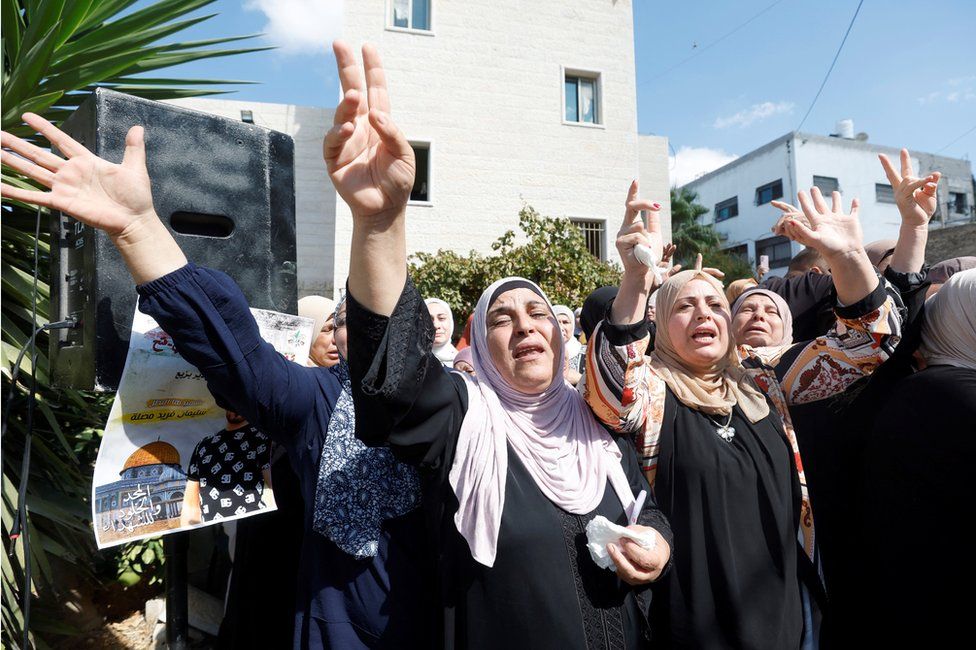
Abed Wadi was getting dressed for the funeral when the message arrived.
It was an image, forwarded to him by a friend, of a group of masked men posing with axes, a petrol canister, and a chainsaw, with text printed on the image in Hebrew and Arabic.
“To all the rats in the sewers of Qusra village, we are waiting for you and we will not mourn you,” the text said.
“The day of revenge is coming.”
Qusra is Wadi’s village, in the northern part of the West Bank near Nablus. The funeral that day was for four Palestinians from the village. Three had been killed the previous day – Wednesday 11 October – after Israeli settlers entered Qusra and attacked a Palestinian family home.
The fourth was shot dead in clashes with Israeli soldiers that followed.
The following day, the Qusra villagers were preparing to set out for a hospital half an hour away and return with the bodies of the dead. To do so, they would need to travel across land that is dotted with Israeli settlements, where the risk of violence, high even in ordinary times, has risen dramatically in the two weeks since Israel went to war with Hamas.
Wadi put his phone down and continued getting dressed. There were four men in refrigerators in the hospital who needed to be brought home. He was not going to be deterred by a threat, he said. He had heard too many.
There was no way for Wadi to know that, in a few hours’ time, hardline Israeli settlers would confront the funeral procession and his own brother and young nephew would be shot dead.
“If we had delayed one or even two days, what good would it have done?” Wadi said, sitting in the shaded courtyard of his family home in Qusra.
“Do you think that the settlers would have left this place on the second day?”
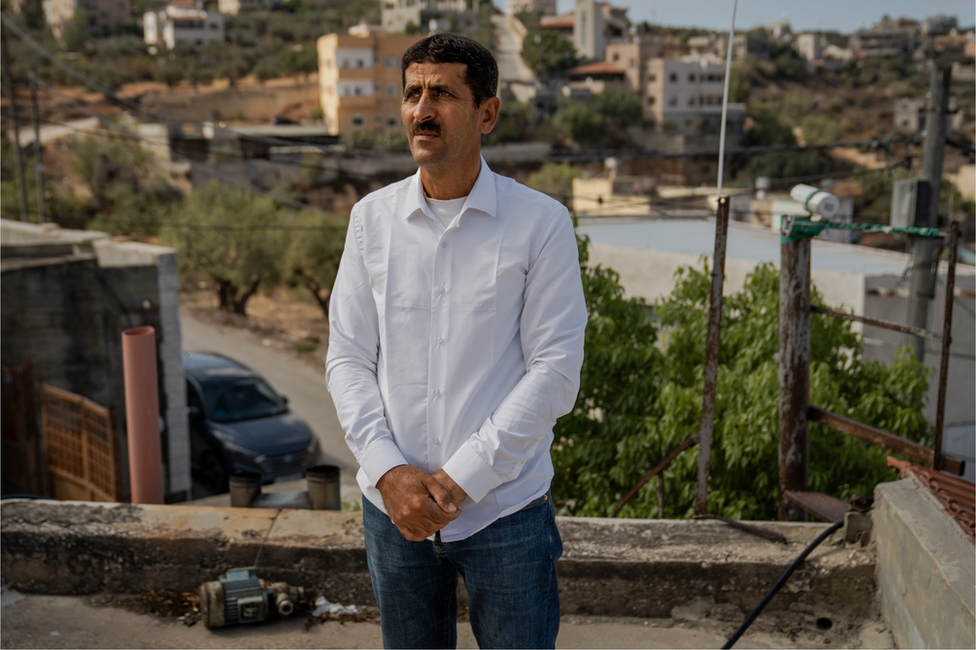
According to the UN’s humanitarian office, the week that followed Hamas’s murderous attack was the deadliest for Palestinians in the West Bank since it began reporting fatalities in 2005, with at least 75 Palestinians killed by the Israeli military or settlers, and incidents of settler violence up from an average of three a day to eight.
In one raid on a Palestinian refugee camp, and a rare air strike in the region, on Thursday 12th, Israeli forces killed at least 12 people, Palestinian officials said, and Israeli police said one officer was killed.
There was “a real risk” of the occupied territory “spiralling out of control”, the UN said this week.
Palestinian residents of the West Bank say that while the world’s attention is drawn to the unfolding disaster in Gaza, Israeli settlers are taking advantage by entering villages and expelling, and even killing, Palestinian civilians.
In at least three cases, according to video footage or eyewitness testimony from villagers, the settlers have been wearing military uniforms or accompanied by the Israeli military in their attacks.
The first three men who died in Qusra had gone to defend a family in a house on the outskirts of the village, after settlers approached the house and began throwing rocks at it, several residents told the BBC.
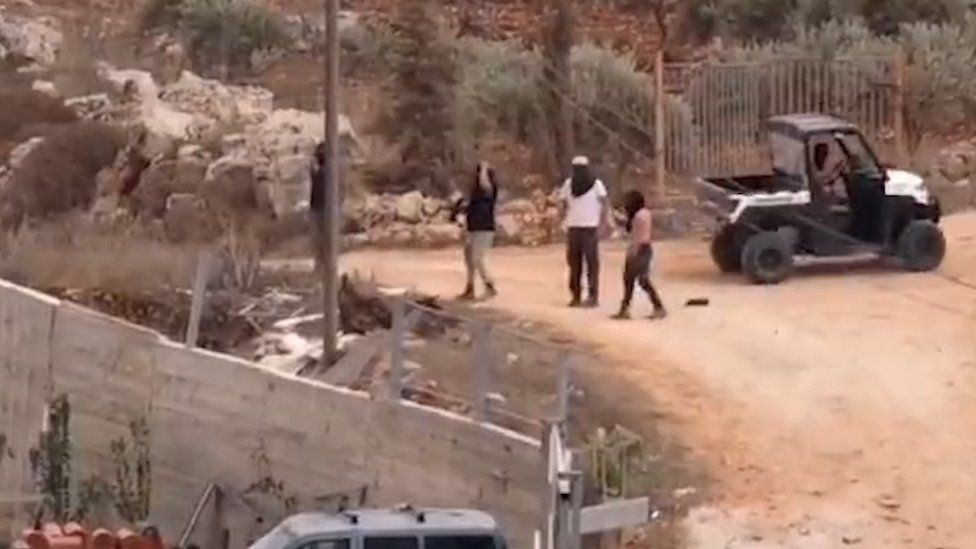
They say the settlers then opened fire at the Palestinian neighbours who came to assist, killing three young men – Hasan Abu Sorour, 16, Obayda Abu Sorour, 17, and Musab Abu Reda, 25 – and gravely wounding several others. Moath Odeh, aged 21, was killed later in clashes with soldiers.
Among the wounded were a father and his six-year-old daughter, who lived at the house, who were shot in the face and in the abdomen respectively, according to two people who received the dead and wounded at a nearby medical clinic.
One of those assisting at the clinic was Amer Abu Sorour, another cousin of the victims. It fell to Amer to call Said Abu Sorour, the father of 17-year-old Obayda.
“I told him, your son is lightly injured,” Amer said, in an interview alongside Said in Qusra on Tuesday. “I could not give him this shock over the phone.”
Said rushed to the medical centre.
“They told me that my son was injured but there was no way for me to see him at that moment,” he recalled, his eyes shiny with tears.
“I told them I wanted to see my son now, and I entered that room and I saw that by the grace of God he had been martyred.”
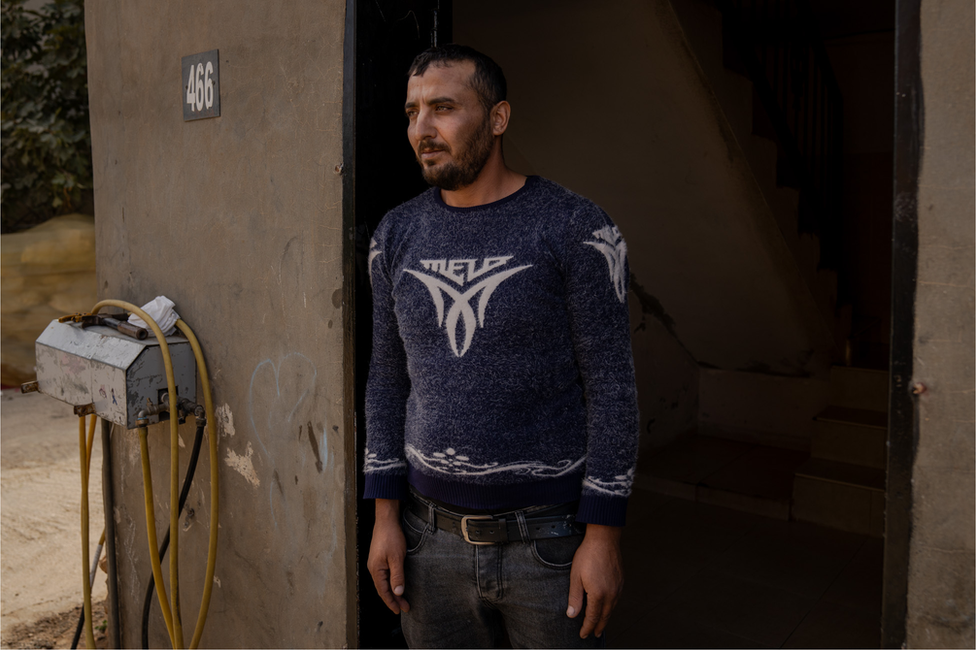
The following day was set to be the funeral for the four victims. Abed Wadi put the image of the masked men with axes and chainsaws out of his mind and joined the funeral convoy bringing the bodies back from the hospital to Qusra.
As the cars and ambulances made their way along the Nablus-Ramallah road, the convoy was ambushed by hardline Israeli settlers. In the clash that followed, according to video footage and eyewitness testimony, settlers pelted the convoy with stones, some members of the funeral convoy threw stones back, and the Israeli settlers and soldiers responded with live fire.
In the “chaos and heavy, random gunfire,” Abed Wadi lost track of his brother, Ibrahim, a 63-year-old local politician with the Fatah Movement, and Ibrahim’s son Ahmed, a 24-year-old law student. Video footage of part of the confrontation appears to show Ahmed and others running away from the gunfire, before Ahmed is cut down by bullets on the road.
“They told me my nephew was shot twice in his stomach and once in his neck, and my brother was shot in his waist, towards his heart,” Wadi said.
“There were no weapons in our funeral convoy,” he said. “Usually we would fly the Palestinian flag from the cars but we did not even fly our flag, because of the fear.”
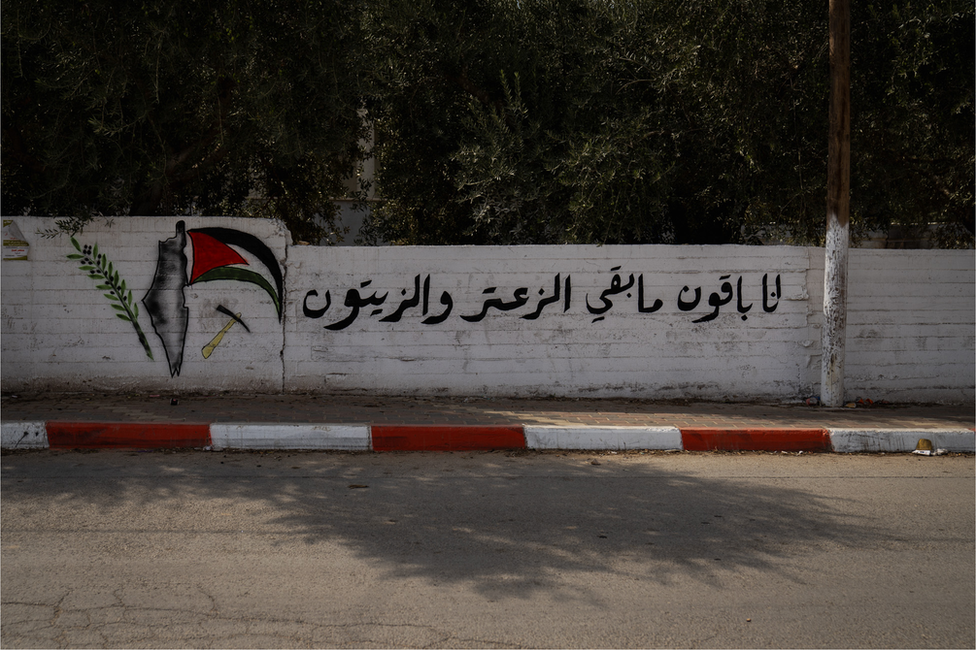
Residents in Qusra told the BBC this week that fear had permeated the village. Last weekend was the beginning of olive season in the area, but residents who depend on the harvest for their income said they would not go to the groves on the outskirts of the village for fear of settlers shooting.
There had already been a significant increase in violence by Israeli settlers this year, even before the Hamas attack, according to UN data, with more than 100 incidents reported each month and about 400 people driven from their land between January and August.
Israeli human rights organisation B’Tselem told the BBC that since the attack, it had documented “a concerted and organised effort by settlers to use the fact that the entire international and local attention is focused on Gaza and the north of Israel to try to seize land in the West Bank”.
Partial data compiled by B’Tselem, covering the first six days after the Hamas attack, recorded at least 46 separate incidents in which it said settlers threatened, physically attacked or damaged the property of Palestinians in the West Bank.
“A lot of shepherding families and communities have fled because they were threatened in the past week by settlers,” said Roy Yellin, a spokesman for B’Tselem. “Settlers have been giving residents a deadline to leave and telling them if they don’t they will be harmed. And some villages have been totally emptied out.”
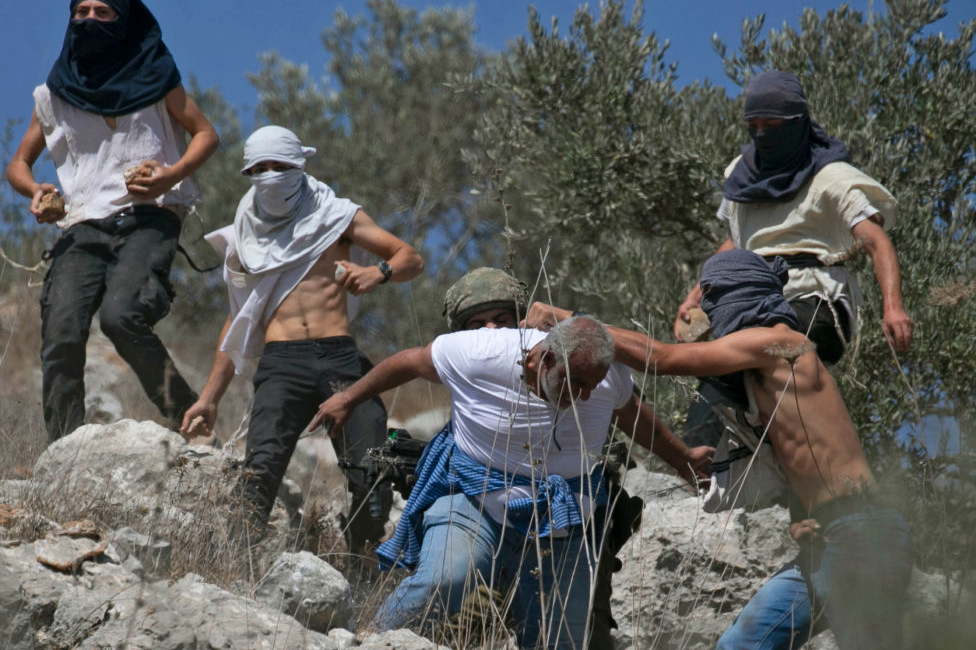
One of those villages was Wadi al-Siq, near Ramallah, previously home to a Palestinian Bedouin community of about 200. “For months we have been facing harassment and attacks from settlers day and night, but since the start of the war the attacks increased,” said Abdul Rahman Kaabna, 48, a farmer from Wadi al-Siq.
On 9 October, a group of approximately 60 settlers, many dressed in military uniforms, attacked the community, according to two now-exiled residents. “They attacked us with weapons and terrified everyone,” Kaabna said. “Then they gave us one hour to go out with our sheep and threatened us to death if we didn’t leave.”
The residents walked more than 10km (6.2 miles) to escape, said another resident, Ali Arara, 35. “The settlers stole everything from our homes,” he said. “My daughter was terrified. They beat us and left us with nothing.”
According to B’Tselem and Yesh Din, another Israeli human rights group which monitors West Bank violence, the intimidation and forced displacement reported in Wadi al-Siq has been repeated in communities across the territory since 7 October.
In one of the most shocking incidents caught on film in the past week, an Israeli settler entered a Palestinian village called Al-Tuwani near Hebron and shot an unarmed Palestinian resident in the stomach at point blank range, while an Israeli soldier appeared to look on.
The incident began when two armed settlers, accompanied by a soldier, attacked a home on the outskirts of the village, according to three residents including the homeowner.
“Three Israelis came to my house, they were armed, and one was wearing the uniform of the army,” said Musab Rabai, 36.
“One of the settlers came into the house, pushed me and beat me on the head with the gun and told me he was going to shoot me.
Neighbours responded to Rabai’s shouts for help, he said. Among them was Zakriha Adra, a father of four. Video footage filmed by Adra’s cousin, Basel, shows the settler who allegedly beat Rabai and the Israeli soldier standing a short distance away from the group of Palestinian neighbours. The armed settler then suddenly approaches Adra, strikes him with his rifle and shoots him in the stomach from just a few feet away.
Throughout the encounter, Adra appears to be holding his arms by his sides in a non-threatening manner.
Zakriha Adra was wounded by a shot to his stomach at close range
According to the family, Adra is now in hospital in critical condition. “He survived but the bullet has done a lot of damage inside his stomach,” said Basel, his cousin.
Musab Rabai, whose house was attacked, said the shooting had been a culmination of days of threatening behaviour and property destruction by the settlers.
“Since Saturday they have been standing around the village armed with guns and using a bulldozer to destroy trees,” he said. “The men here in the village have been sleeping in shifts, only a few hours each, so there is always someone awake in case the settlers attack.”
The BBC asked the Yesha Council, the umbrella organisation for the settlers in the West Bank and elsewhere, to comment for this story but they declined. Moti Yogev, the acting deputy head of the Binyamin Council, which also represents settlers in the region, said that violent settlers “belonged to the fringes” of the settler community. “If they do exist, they should be dealt with like any other criminal,” he said.
The Israeli military and Israeli police force did not respond to multiple requests for comment.
“The most tragic thing is that the violence by these extreme settlers does not produce any response from the Israeli military,” said Dov Khenin, a former Israeli politician and peace activist. “And the violence has its own purpose, to get rid of these small Palestinian communities, to eject them from their homes.”
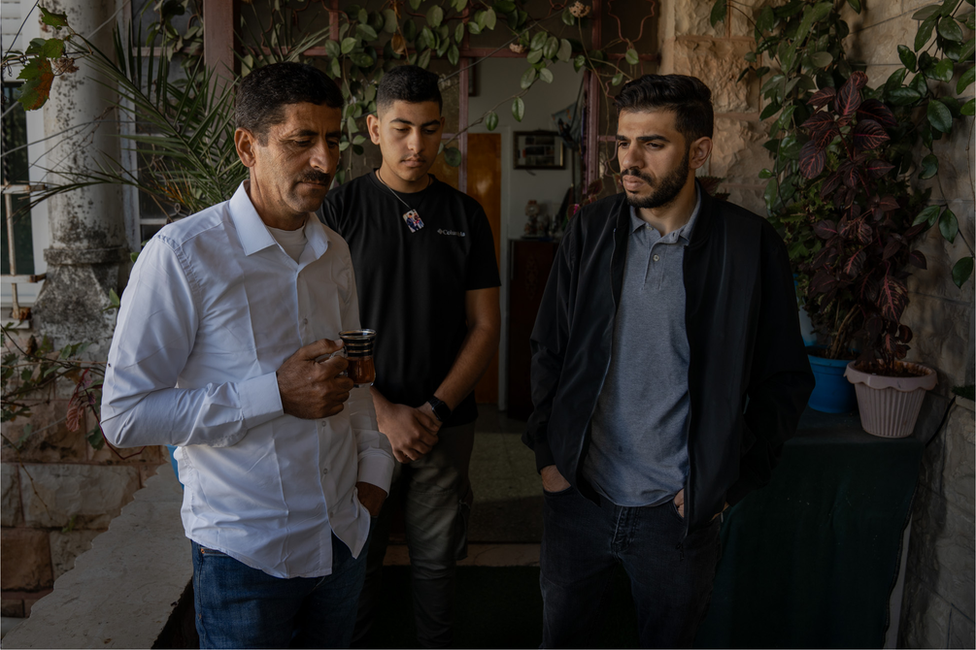
The fear for many Palestinians now is that the situation in the West Bank will only get worse. Israel’s National Security Minister, Itar Ben Gvir, announced last week that the government would purchase 10,000 rifles to arm Israeli civilians, including those in West Bank settlements – a move that threatens to further blur the lines between armed settlers and members of the military in the occupied territory.
In Qusra, Abed Wadi said he had heard the news about the 10,000 rifles. He shook his head. “It won’t change anything for the people of Qusra,” he said.
Wadi was sitting in his courtyard, surrounded by posters bearing the image of his brother, his nephew, and the four other men from the village who were killed last week.
“We have always seen the rifle in the hands of the settlers, they have been shooting at us for a long time,” he said.
But something had changed, he said. It seemed as though the settlers had become more aggressive, more radical. “Farm houses are being burned, olive trees cut down, cars broken into, land is being stolen,” Wadi said.
“And this is just our village. If you were to look to the next village and the next village, you would find anger and pain in every one,” he said. “And you would see no end to it.”
Alla Badarna contributed to this report. Photographs by Joel Gunter.
